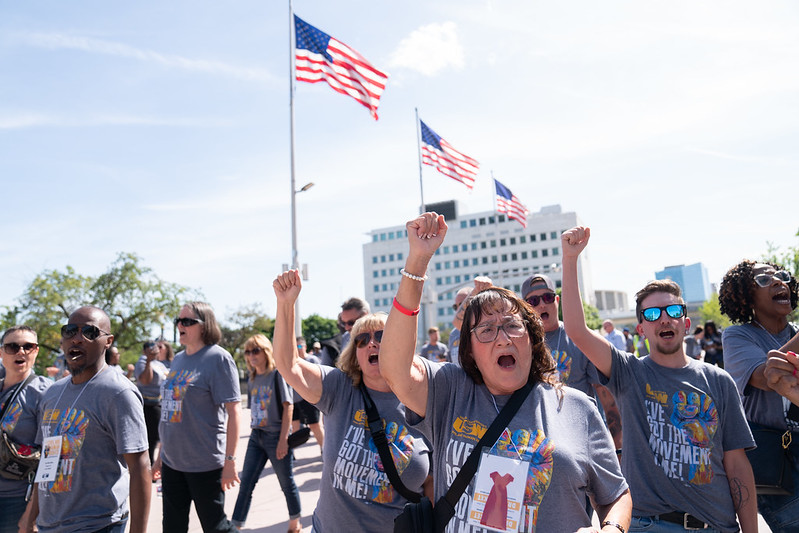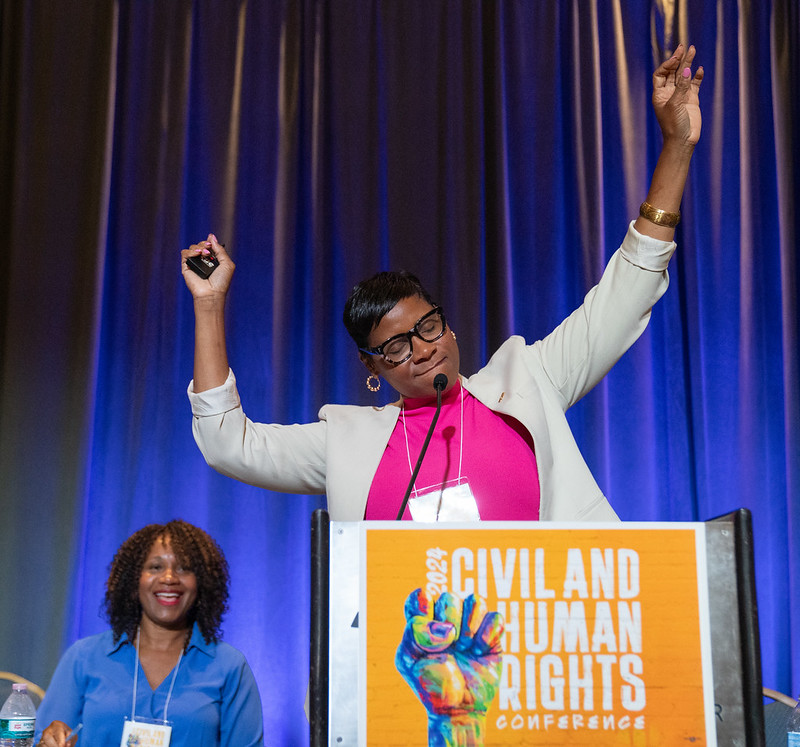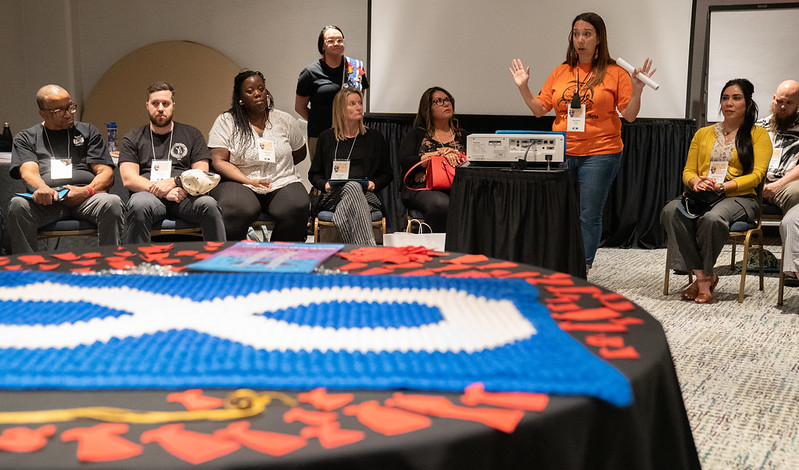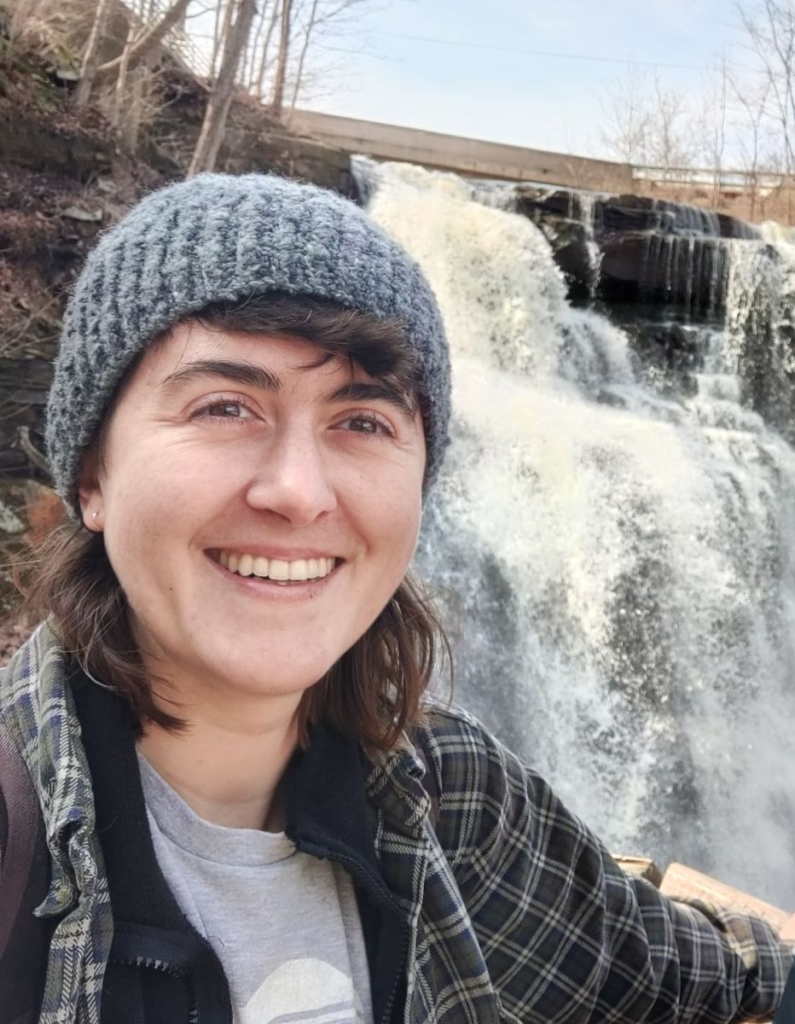USW Activists Get Moving for Collective Liberation in Detroit

Nearly 500 USW members and activists rallied at the Transcending arch monument in Detroit, Mich., on Tues., June 11, their chants demanding social and racial justice for all workers echoing through the downtown streets.
The “Time to Move” rally was part of the USW Civil and Human Rights Conference, held June 9-12 in the Motor City. Focused around the theme “I’ve Got the Movement in Me,” the gathering was the first of its kind since before the COVID-19 pandemic swept across the globe, revealing long-lasting racial and economic disparities.
The conference kicked off on the evening of Sun., June 9, with a welcome by USW Vice President of Human Affairs Kevin Mapp. The former industrial maintenance mechanic was born and raised in Detroit and serves on both the metro-Detroit and national boards of the A. Philip Randolph Institute (APRI), where he works to promote social and economic justice, voting rights and community education.
“This is a time to recommit to the fight for collective liberation and celebrate the victories we’ve achieved together,” Mapp told the crowd at the Marriott Renaissance Center.
Mapp also reminded the activists what most of them already know – the outcome of the upcoming general election this November will have profound impacts on marginalized communities.
“It’s overwhelming,” Mapp said, “and here’s the truth – we must be all in on women’s rights, on LGBTQ+ rights, on immigrants’ rights, on voting rights, as the rich and powerful look to divide and dominate us.”
Wins for Workers
The following day, Vice President at Large Roxanne Brown got the group fired up for their first full day of workshops with a fiery and informative speech. She focused on the many ways working-class and marginalized people have benefited from the Biden administration’s policies, including the expansion of the Child Tax Credit, which cut the Black child poverty rate in half in 2021.
“Can we afford to lose?” Brown asked the crowd, who responded with a resounding “No!”

Brown also highlighted the historic low unemployment rates among both Black and Latino Americans. Later in the day, during an afternoon plenary focused on organizing both of these marginalized communities, USW organizer Leshonda Reeves noted the importance of listening to and uplifting Latino and Spanish-speaking workers.
“Most of the Latino workers don’t feel they are included or welcome in these facilities,” said Reeves, who helped organize workers at Kumho Tire in Georgia. “We have to fix that because they and Black workers are now the largest percentage of the workforce in the South.”
On the second day, during the morning plenary focused on the importance of solidifying global connections, Susan Matthews of IndustriALL Global Union highlighted the shared challenges faced by workers in the United States, Canada, and the United Kingdom, including rising fascism.
“You in America are more resilient than you know,” said Matthews. “When you feel you want to give up, remember you have the unity of your union.”
Resilience and Reconciliation
A morning panel continued on the theme of resilience and reconciliation with a group of activists in both the United States and Canada speaking on how the union is aiding Indigenous members. Julia McKay, who works in a mine and also serves as USW District 3’s Indigenous Engagement Coordinator, said this work is particularly important in Canada, where the majority of mining occurs on Native land.
Chelsea Olar, who is a heavy equipment operator and proud member of Local 2251, also said this activism is meaningful because of the educational opportunities it provides.
“Whether it’s a workshop or a caucus or a panel like this, it provides a safe space for Indigenous members to share their stories and helps non-Indigenous members understand what we experience,” said Olar.
The conference’s third and final day of conversations and workshops began with a discussion on how marginalized communities’ struggles and destinies are interwoven. Pride at Work Executive Director Jerame Davis spoke on the need for all unions to be involved with LGBTQ+ workers’ rights as attacks on their livelihoods increase.
“As members of the labor movement, we have a responsibility not only to our fellow workers but to future generations,” said Davis. “We must be on the right side of history standing up for justice and equality for all.”
Jessica Rios Viner, member of Local 3657 and president of the Pittsburgh chapter of the Labor Council for Latin American Advancement (LCLAA), reiterated this need for unwavering solidarity when she spoke about immigrants’ rights.
“When you invest in your immigrant workers, you invest in your union.”

After several days of learning and sharing, Bryan Combs, a member of Local 9443 in Kentucky, reflected on the connections he made between labor and social justice.
“I always wore two hats: one for civil rights and one for labor,” said Combs. “After this, I think I’m just going to put both of them together and go at it that way.”
Vice President Mapp concluded the week at the closing reception by encouraging the members to take what they learned back to their locals and communities.
“Talk to your friends and families and coworkers, hit the streets for worker-friendly candidates, and never, ever stay silent,” said Mapp.
Click here to view all photos from the conference.
By clicking Sign Up you're confirming that you agree with our Terms and Conditions.
Recent News Articles
Want to Learn More?
See how the USW is making a real difference in our communities and our workplaces.

